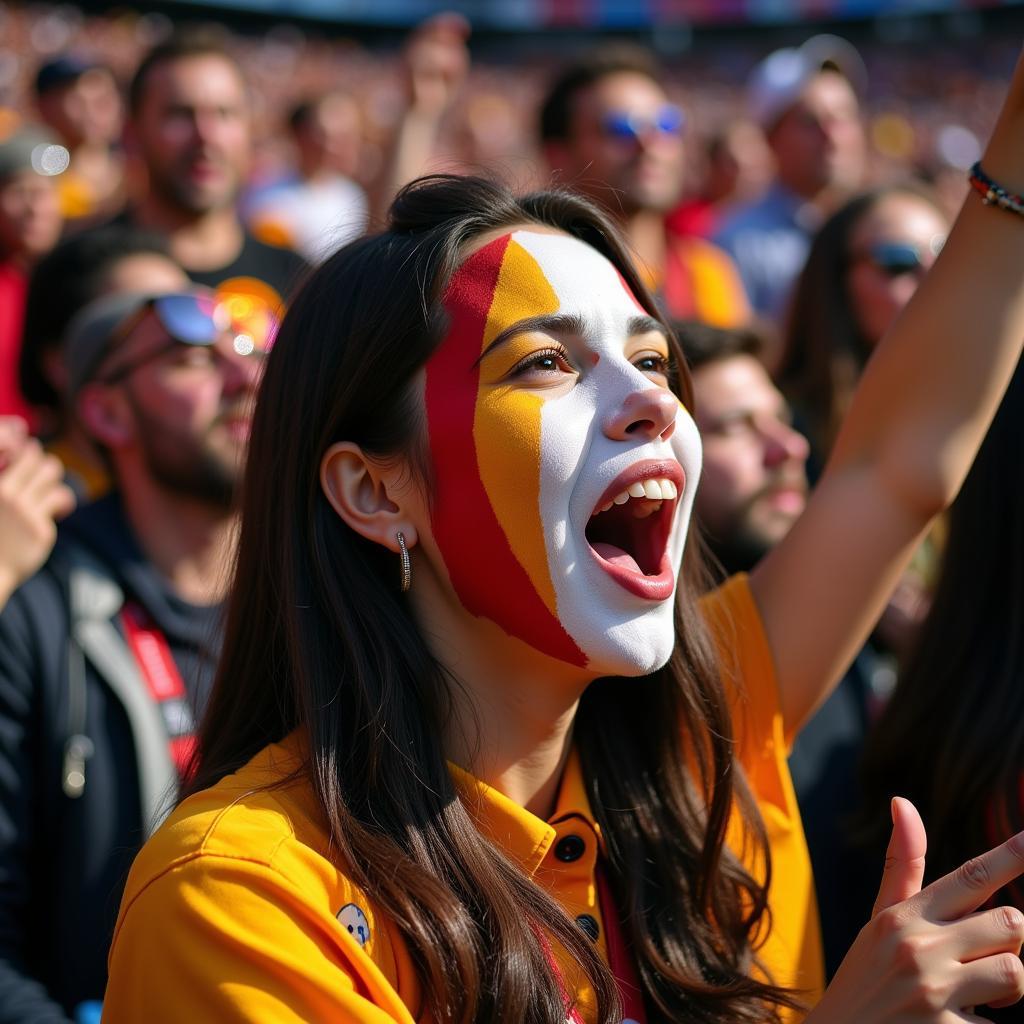A football fanatic, often referred to as a “die-hard fan” or simply a “fanatic,” is someone who takes their love for the beautiful game to another level. It’s not just about enjoying the matches; it’s about living and breathing football. But what truly defines a football fanatic? Let’s delve into the characteristics, behaviors, and motivations that set these passionate individuals apart.
The Anatomy of a Football Fanatic
While casual fans might enjoy a weekend match or follow their national team during a major tournament, fanatics take their devotion much further.
Unwavering Loyalty and Passion
 Fan wearing team colors
Fan wearing team colors
A true mark of a football fanatic is unwavering loyalty to their team. Through triumphs and defeats, they stand by their club, celebrating victories with unmatched enthusiasm and enduring losses with stoic acceptance. This loyalty often extends beyond the professional level, encompassing local clubs and youth teams.
Encyclopedic Knowledge
Ask a football fanatic about their team, and be prepared for a detailed history lesson. They possess an encyclopedic knowledge of their club’s history, players, statistics, and even obscure trivia. They can recount legendary matches, iconic goals, and the lineage of managers with astonishing accuracy. This depth of knowledge stems from a genuine fascination with the sport and an insatiable thirst for information related to their team.
Rituals and Superstitions
Football fanatics often develop rituals and superstitions they believe influence their team’s performance. Whether it’s wearing a lucky jersey, watching matches from a specific spot, or eating the same pre-game meal, these rituals provide a sense of control and connection to the game’s unpredictable nature.
Immersive Experiences
For fanatics, watching a match is not a passive activity but an immersive experience. They’re emotionally invested in every pass, tackle, and shot. Their homes often resemble shrines to their beloved team, adorned with jerseys, scarves, and memorabilia. They might even travel extensively to watch their team play, both domestically and internationally.
The Psychology Behind Football Fanaticism
What drives this intense passion for a sport? While the answer is complex and multifaceted, several psychological factors contribute to football fanaticism.
Social Identity and Belonging
Supporting a football team can provide a strong sense of social identity and belonging. It connects individuals to a larger community of like-minded people who share their passion and loyalty. This sense of belonging is particularly potent in the context of live matches, where fans collectively celebrate and commiserate, forging strong social bonds.
Emotional Release and Catharsis
Football provides an outlet for emotional release. The highs of victory and the lows of defeat offer a cathartic experience, allowing fans to express a range of emotions. This emotional investment can be both exhilarating and therapeutic, contributing to the addictive nature of football fandom.
Nostalgia and Shared Memories
For many, football is intrinsically linked to childhood memories and family traditions. Sharing the passion for a particular team across generations creates a powerful bond and a sense of continuity.
Fan Culture and Its Impact
Football fanaticism extends beyond individual passion, shaping a vibrant and influential fan culture.
Fan Groups and Communities
Fan groups play a crucial role in fostering a sense of community and amplifying the collective voice of supporters. From organized chants and displays of banners to online forums and social media groups, these communities provide platforms for fans to connect, share their passion, and engage in constructive dialogue about their team.
Social and Charitable Initiatives
Many fan groups go beyond cheering for their team, actively engaging in social and charitable initiatives. They organize fundraisers, support local communities, and use their platform to raise awareness about important social issues. This positive impact highlights the transformative power of football fandom.
Conclusion
Football fanaticism is a testament to the power of sport to evoke passion, loyalty, and a profound sense of belonging. From the unwavering support to the encyclopedic knowledge and the shared rituals, these devoted individuals add a unique dimension to the beautiful game. While the intensity might vary, their love for the sport is undeniable, transforming them from mere spectators into integral parts of the football ecosystem.
FAQs
- Is there a difference between being a fan and a fanatic?
While all fanatics are fans, not all fans are fanatics. Fanaticism implies a deeper level of emotional investment, knowledge, and commitment to a team or sport.
- Can football fanaticism be unhealthy?
Like any passion, football fanaticism can become unhealthy if it consumes an individual’s life, negatively impacting their relationships, work, or well-being.
- How can I become more knowledgeable about football?
Start by following your favorite team, reading articles and books about the sport, watching documentaries, and engaging in discussions with fellow fans.
If you need further assistance, feel free to contact us. We are available 24/7 to answer your questions. You can reach us at:
Phone Number: 0903426737
Email: [email protected]
You can also visit us at our office:
Address: Tổ 9, Khu 6, Phường Giếng Đáy, Thành Phố Hạ Long, Giếng Đáy, Hạ Long, Quảng Ninh, Việt Nam.


